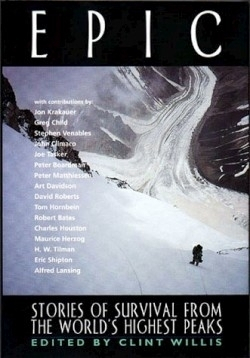It looks like you've stumbled upon a page meant to be read by our code instead of viewed directly. You're probably looking for this page.

Epic
Stories of Survival from the World's Highest Peaks
Willis, in his introduction, saysthe mountaineering meaning of “epic” is a climb gone wrong; just the opposite of its traditional definition.
He, however, has done much right in compiling this collection of seven expeditions. Two are in Alaska, four in the Himalayan range-home to Mt. Everest-and one in the Antarctic region. The stories are all structured as chronologies, detailing the physical climbs and their effects on the climbers’ bodies and minds. It is the latter, the revelation of thoughts and emotions produced by extreme conditions that absorb listeners.
The pride and thrill of achieving a summit is described vividly, both in terms of vocal inflection and vocabulary choice. The anguish over losing a climbing comrade, the despair after realizing one is lost and the hope of rescue from bad weather are found in almost every story.
The stories follow a similar pattern, except for one: Art Davidson’s tale of being stranded in an ice cave with two companions on Denali (Mt. McKinley) while a storm rages for nearly a week. While their descent is eventually described, most of the excerpt is an account of how the trio survived the ordeal. Davidson honestly shares his own self-preservation urges, disregarding the negative light they sometimes shed on his character, such as his reluctance to share his warm booties with a friend whose feet are freezing. In another portion, after their food supply has been rationed to almost nothing, they ease their hunger pangs and simultaneously while away the hours by imagining all the food they’ll eat when they finally get off the mountain.
Davidson’s story is superior because most listeners, even those without personal tales of whiteouts, avalanches and altitude sickness, will be able to relate to the universally human themes it sounds. It is a wise inclusion by an editor who describes himself as an “armchair mountaineer.”
Epic includes a fair amount of mountaineering jargon. Context allows listeners to figure out many terms, but sometimes not. Even listeners with sharp ears will find it difficult to figure out words they might want to look up, especially foreign words. On the other hand, those words, many of French derivation, do enrich the readings, and help give listeners a sense of the history of mountaineering. Willis concludes his introduction by saying Epic is “a collection for readers who love good writing. It helps if you love the mountains, too.” He is correct on both counts.
Reviewed by
Cari Noga
Disclosure: This article is not an endorsement, but a review. The publisher of this book provided free copies of the book to have their book reviewed by a professional reviewer. No fee was paid by the publisher for this review. Foreword Reviews only recommends books that we love. Foreword Magazine, Inc. is disclosing this in accordance with the Federal Trade Commission’s 16 CFR, Part 255.